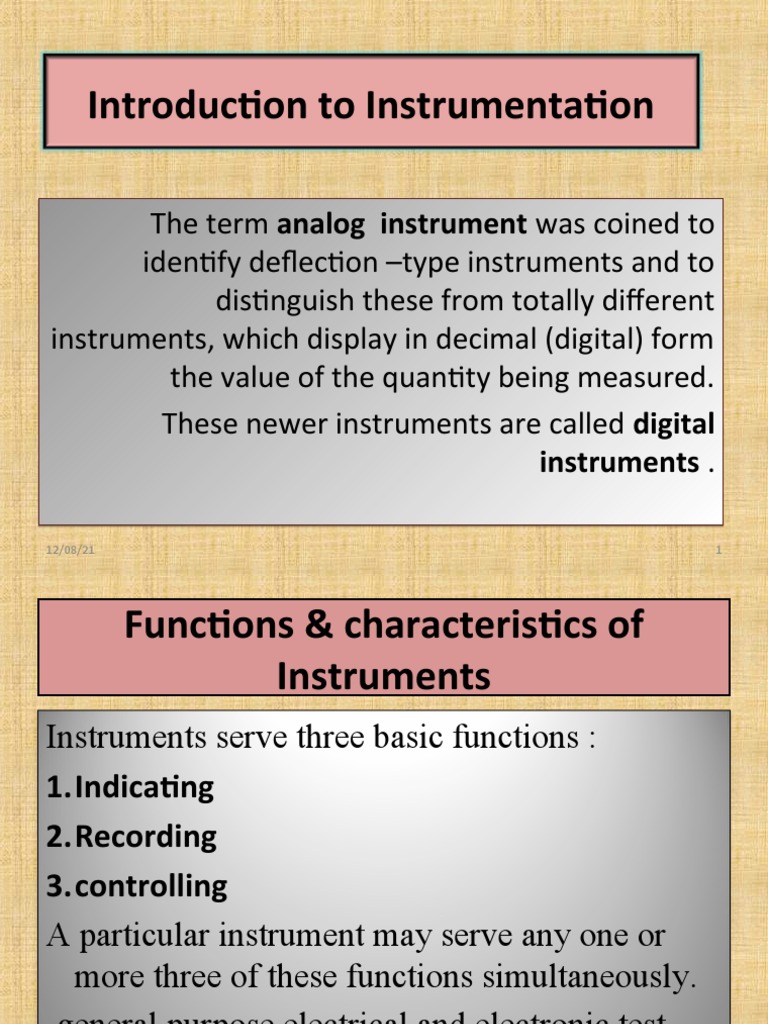What if you had to measure the most elusive phenomena in the universe without the right tools? Imagine hunting for the secrets of the cosmos, only to find yourself limited by rudimentary instruments. This notion brings us to a pivotal question in the field of physics: what is instrumentation, and why is it indispensable in both experimental and theoretical realms?
Instrumentation, in the context of physics, refers to the array of tools and devices employed for measuring physical quantities. These instruments serve as the bridges connecting abstract theories with tangible reality. They allow physicists to gather empirical data, analyze complex systems, and validate theoretical models. Thus, a robust understanding of instrumentation is not merely beneficial; it is foundational to the advancement of scientific knowledge.
To comprehend the breadth of instrumentation, one must first appreciate its historical evolution. The earliest instruments, such as the astrolabe and barometer, were rudimentary yet groundbreaking. They enabled early scientists to measure time, celestial positions, and atmospheric pressure. As the centuries progressed, so did the sophistication of these tools. The advent of the microscope unveiled the invisible world of microorganisms, while the spectroscope allowed for the analysis of light spectra, revealing the intricate makeup of stars and chemical elements.
Today, the landscape of instrumentation in physics encompasses a vast array of devices, each tailored for specific measurements and applications. Common categories include mechanical, electrical, optical, and thermal instruments. Mechanical instruments involve devices like calipers and scales, which are fundamental for measuring dimensions and weights. Meanwhile, electrical instruments such as ammeters and voltmeters quantify electrical properties with precision, facilitating advances in electronic engineering and physics alike.
As we delve deeper, one uncovers the pivotal role of sensors in modern instrumentation. Sensors convert physical phenomena into readable signals, enabling real-time data acquisition. For instance, thermocouples measure temperature through the thermoelectric effect, while strain gauges detect deformation in materials by converting mechanical strain into an electrical signal. The synergy between sensors and digital technology has revolutionized data collection and analysis, introducing an era of unparalleled accuracy.
Instrumentation also serves as a linchpin within specialized subfields of physics. In quantum mechanics, for instance, the need for precise measurement is paramount. Quantum instruments, such as atomic force microscopes, allow researchers to observe phenomena at atomic and subatomic scales. The duality of light and matter, a cornerstone of quantum theory, is elucidated through innovative measurement techniques. Thus, instrumentation not only aids in experimentation but can also redefine our understanding of fundamental concepts.
Let’s consider where instrumentation encounters its profound challenges. One critical challenge arises from noise—unwanted deviations in measurement that can obscure true signals. In an age of sophisticated detectors and advanced algorithms, the quest for signal fidelity remains paramount. Researchers must often engage in a meticulous process of calibration, filtering, and signal processing to extract meaningful data from the cacophony. This intricate dance between accuracy and noise epitomizes the continuing evolution of instrumentation in science.
Furthermore, the integration of instrumentation with computational physics has ushered in new paradigms of research and discovery. Data analysis software plays a crucial role in processing the enormous datasets generated by modern instruments. The confluence of instrumentation and computational power enables simulations that model complex physical systems—from climate models to particle collisions in accelerators. This dynamic interplay between empirical data and computational models enhances predictive accuracy and fosters innovative research methodologies.
In the broader scientific community, instrumentation facilitates interdisciplinary collaboration. Physicists, chemists, and engineers often converge at the intersection of measurements. Advanced imaging systems, such as MRI and PET scans, merge principles from various fields to enhance our understanding of biological processes and materials science. Thus, the impact of instrumentation transcends traditional boundaries, influencing diverse domains and shaping future discoveries.
However, the challenge of accessibility arises when discussing instrumentation. While the price of high-end instrumentation can be prohibitive, innovative initiatives are continually striving to democratize access. Open-source software and low-cost measurement devices are emerging as pathways for educational institutions and developing regions to participate actively in scientific inquiry. This democratization is vital; it invites a broader array of voices into the scientific discourse, enriching the field with diverse perspectives and innovations.
To encapsulate, instrumentation in physics is not a mere collection of tools; it is a multidimensional framework that fosters exploration, experimentation, and enlightenment. It is instrumental in probing the depths of the universe, unraveling the mysteries of nature, and bridging theoretical physics with pragmatic applications. From the historical evolution of measurement devices to the current challenges posed by noise and data analysis, instrumentation remains an ever-evolving cornerstone of scientific inquiry.
In conclusion, the role of instrumentation in physics is pivotal, shaping our understanding of the physical world while continuously presenting new challenges and opportunities. As scientists pave the way for innovative solutions in measurement, one must ponder: what new frontiers in physics await us as we refine our instruments and expand our capabilities? The pursuit of knowledge is relentless, and instrumentation will undoubtedly lead the charge into the unknown.










